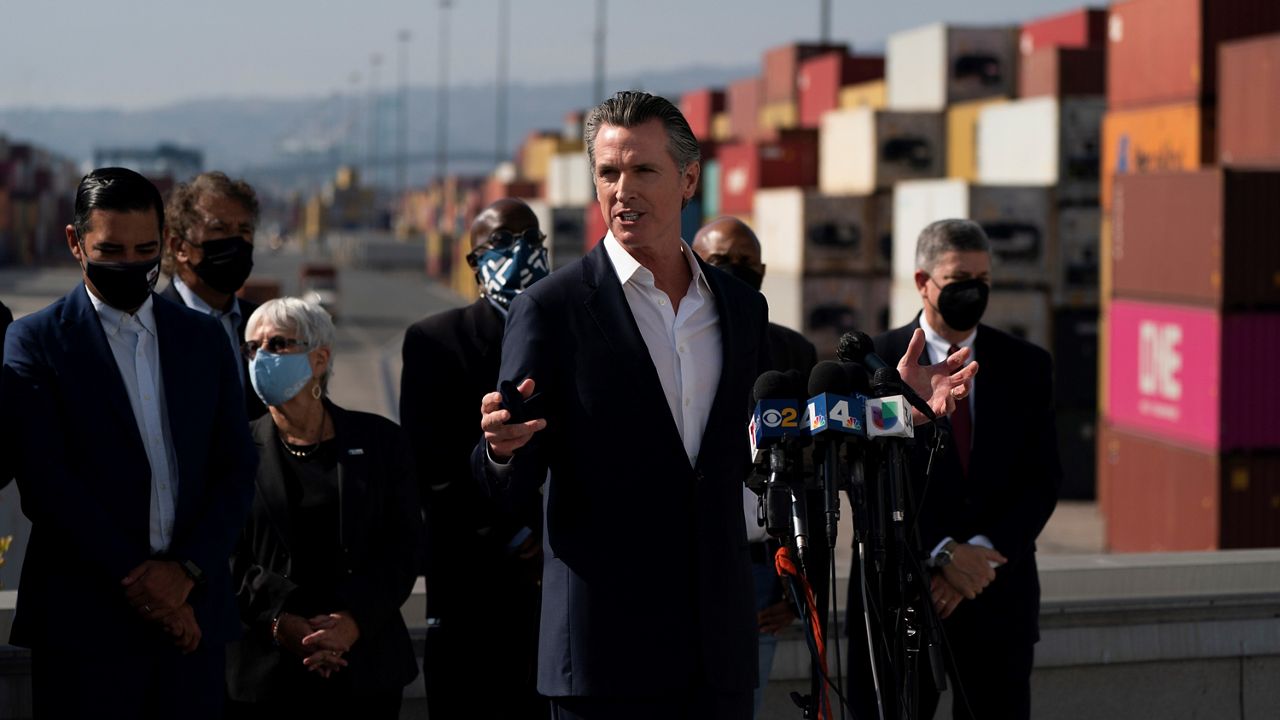LONG BEACH, Calif. (CNS) — Gov. Gavin Newsom said Wednesday he sees signs of progress being made in relieving a backlog of cargo at the Los Angeles/Long Beach port complex but said more needs to be done long-term to bolster funding to further improve the flow of goods through one of the world's busiest seaports.
What You Need To Know
- Standing alongside Los Angeles Mayor Eric Garcetti and Long Beach Mayor Robert Garcia, Newsom also said there has been a roughly 32% reduction in the number of containers sitting at the ports waiting to be picked up
- The governor said the state will aggressively seek its fair share of $17 billion in funds earmarked for port improvements in the newly signed federal infrastructure package
- "We're going to be front and center. We're going to be aggressive. We're going to be bold. We're going to demand our fair share of investment," he said
- Major shippers and retailers, including Walmart, FedEx, UPS, Samsung, The Home Depot and Target, agreed to speed up operations to clear cargo out of the ports and free up more space on the docks
Newsom also announced that the state has agreed to temporarily ease weight limits for cargo trucks carrying containers out of the port, lifting the maximum from 80,000 pounds to 88,000 pounds. He said the move will primarily speed the transport of industrial and manufacturing cargo.
Standing alongside Los Angeles Mayor Eric Garcetti and Long Beach Mayor Robert Garcia, Newsom also said there has been a roughly 32% reduction in the number of containers sitting at the ports waiting to be picked up.
"So there's real progress that demonstrably has been made in moving things forward, there's just a lot more work to be done," he said.
He said more "sweeper ships" have been coming through to remove empty containers from the docks, and some shipping companies have diverted cargo to Northern California to ease the stress on the Southland ports.
The governor also praised the work being done by cargo-handlers in the face of mounting merchandise volume.
"We've never seen six containers stacked high. You've never seen sites like you're seeing here," he said. " ... What we're seeing here is success in this respect — and I just want to make sure this is part of our conversation — and that's the productivity of the men and women that are working these ports that are doing an unprecedented amount of work at unprecedented speed and scale.
"This (backlog) is not because they're not doing an extraordinary job. This is because of extraordinary demand. We have record-breaking throughput, unprecedented in this state, this nation's history, because of their hard work, commitment and resolve. They're not dialing it in. They're not phoning it in. They're not calling in sick. They're not just pointing fingers. They're the guys and gals on the ground getting stuff done."
The governor said the state will aggressively seek its fair share of $17 billion in funds earmarked for port improvements in the newly signed federal infrastructure package, saying the state has been short-changed in the past.
"We're going to be front and center. We're going to be aggressive. We're going to be bold. We're going to demand our fair share of investment," he said.
President Joe Biden announced on Oct. 13 that the Port of Los Angeles would join Long Beach in operating 24 hours a day, seven days a week as part of a push from the White House to clear supply chain disruptions threatening the holiday shopping season and slowing the nation's economic recovery from the coronavirus pandemic.
Major shippers and retailers, including Walmart, FedEx, UPS, Samsung, The Home Depot and Target, agreed to speed up operations to clear cargo out of the ports and free up more space on the docks.
That switch to round-the-clock operations hasn't yet been fully implemented, but LA port director Gene Seroka said Tuesday the port has generally operated about 19 hours a day, with flex hours implemented when the cargo surge began.
The ports of Los Angeles and Long Beach announced Monday that their new "Container Excess Dwell Fee" on companies whose containers linger at marine terminals would be delayed until Nov. 22 due to "noticeable progress" made reducing the number of import containers at the terminal.
The fee was announced on Oct. 25 as one of several efforts to speed the processing of cargo at the San Pedro port complex and eliminate a backlog of ships trying to deliver merchandise.



